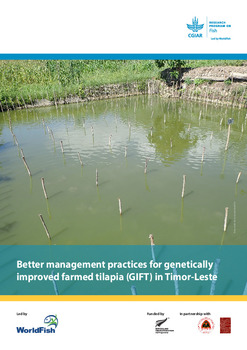Better management practices for genetically improved farmed tilapia (GIFT) in Timor-Leste

Citation
Pant, J. et al. (2019). Better management practices for genetically improved farmed tilapia (GIFT) in Timor-Leste. Penang, Malaysia: CGIAR Research Program on Fish Agri-Food Systems. Manual: FISH-2019-04
Worldwide, the demand for fish continues to grow rapidly. Sustainable intensification and expansion of aquaculture and innovations in fish production systems will be needed to meet this increased demand. It is with this in mind that WorldFish’s 2017–2022 strategy and the CGIAR Research Program on Fish-Agri-Food Systems (FISH) (2017– 2022) have emphasized the need for doubling total food fish production by 2030, particularly in developing countries. In order to achieve sustainable aquaculture growth, however, developing scalable aquaculture technology packages and better management practices (BMPs) interventions are necessary to narrow the fish demand-supply gap in the future while maintaining a healthy ecosystem. In Timor-Leste, aquaculture development has been identified as a way to improve food and nutrition security, diversify livelihoods of coastal and inland communities, and increase economic growth in the country. To tap into the sector’s potential, the government, with assistance from WorldFish, developed its National Aquaculture Development Strategy (NADS) for 2012–2030. The strategy aims to boost fish supply from aquaculture to 12,000 tons by 2030 and contribute to reducing widespread malnutrition by increasing average annual per capita consumption of fish from 6.1 to 15.0 kg. Nile tilapia (Oreochromis niloticus) is the world’s second-most commercially cultured species, after carps. It is a tropical fish suitable for year-round production in Timor-Leste, and Timorese like it because of its taste, versatility and affordability. Genetically improved farmed tilapia (GIFT), which WorldFish has developed through selective breeding, is a fast-growing, hardy and resilient strain of Nile tilapia. It was first supplied to Timor-Leste in 2015 from WorldFish Headquarters in Penang, Malaysia, to the Gleno Fish Hatchery in Ermera. Since then, the hatchery has maintained its genetic quality by following rotational breeding of GIFT cohorts and by producing and disseminating high-quality monosex fingerlings across the country. Along with establishing sustainable seed production and dissemination systems, WorldFish, in partnership with MAF conducted on-farm testing and validation of sustainable GIFT farming technologies applying BMPs. These were carried out from 2016 to 2018 across three municipalities — Ermera, Baucau and Bobonaro — employing a farmers’ field school (FFS) approach. This group-based participatory learning method allows farmers to analyze a problem and reach a solution suitable for their local context. Low-cost feeding and fertilization options based on locally available resources were devised, and with the adoption of these options the FFS participants successfully realized an average extrapolated fish productivity of 4.3±1.5 t/ha/cycle. Thus, it was successfully demonstrated that GIFT can make a notable contribution to improving the food and nutrition security and augmenting the household income of farmers. Scaling successful GIFT farming technologies in a wider agro-ecological context is crucial for creating lasting impacts on the livelihoods of a large number of resource-poor households across Timor-Leste. Taking technical, socioeconomic and environmental aspects into account, this document provides BMP guidelines for scaling sustainable GIFT farming in Timor-Leste. It is available in both Tetum and English to ensure that all stakeholders involved in promoting tilapia aquaculture—from grassroots to the central level— can access and use developed technologies and practices in the country. This manual is one of the outputs of the Partnership for Aquaculture Development in Timor-Leste (PADTL), a 5-year project (2014–2019) funded by the Ministry of Foreign Affairs and Trade (MFAT), New Zealand, and implemented jointly by WorldFish and Timor-Leste’s National Directorate of Aquaculture, Ministry of Agriculture and Fisheries. Mr. Acacio Guterres, director general of fisheries, along with key NDA staff, has provided valuable input while preparing these BMP guidelines. On-farm testing and validation of GIFT farming technologies in Timor-Leste, which the guidelines in this document are based on, became possible because of the voluntary participation of all the FFS participants across Ermera, Baucau and Bobonaro. Led by WorldFish, FISH is developing BMP guidelines at the global level and contextualizing BMP resources at the country level to support sustainable GIFT farming in WorldFish focal and scaling countries. This country-specific BMP manual, produced as part of this approach, aims to enhance the capacity of grow-out farmers and extension service providers in Timor-Leste to support scaling of GIFT sustainably.
Permalink
Date Available
Type
Publisher
Countries
Copyright
CC BY 4.0
Research Themes
Topics
Language